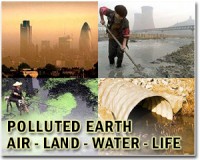 |
Washington (AFP) July 18, 2010 Scientists studying the massive BP oil spill fear a decades-long, "cascading" effect on marine life that could lead to a shift in the overall biological network in the Gulf of Mexico. With some 400 species estimated to be at risk -- from the tiniest oil-eating bacteria to shrimp and crabs, endangered sea turtles, brown pelicans and sperm whales -- experts say the impact of oil and chemical dispersants on the food chain has already begun, and could grow exponentially. "A major environmental experiment is underway," Ron Kendall, director of the Institute of Environmental and Human Health at Texas Tech University, told AFP. "We are already impacting the base of the food chain," he said, including plankton, which provide crucial food for fish, and juvenile shrimp in intertidal marshes along the Gulf Coast. Kendall, whose institute is studying tissue samples from live and dead Gulf fish to analyze the spill's impact, helped study effects of the 1989 Exxon Valdez oil disaster on wildlife in Alaska's Prince William Sound. With the Exxon Valdez, a finite amount of oil poured into the sea -- about one 17th of the low estimate of the oil that has gushed from a ruptured well into the Gulf -- and rose to the surface to coat the shoreline. "This is so much more complex, what we're dealing with now," he said, noting that the 1.84 million gallons (7.0 million liters) of chemical dispersants used to fight the spill has kept some of the oil from fouling shores, but created potentially drastic problems by breaking up the oil has into droplets that may never be recovered. Dispersants, says Kendall, release aromatic hydrocarbons and allow small oil droplets to be consumed by marine life, potentially threatening the food supply for humans. No contaminated Gulf fish or seafood has reached the market, according to experts, but authorities have closed some 35 percent of all fishing waters, threatening the livelihoods of thousands and putting the region's multibillion-dollar seafood industry in peril. Researchers have reportedly observed major die-offs of organisms such as pyrosomes, cucumber-shaped creatures that are favorite meals of endangered sea turtles, which have been dying by the hundreds. Kendall acknowledged that species shifts are possible but added that "we're at the early stages of documenting the scientific effects of what's occurring." BP and the US government say they have found more than 2,600 dead birds, mammals and turtles, but Doug Inkley, a senior scientist at the National Wildlife Federation, warns that could be the tip of the iceberg. Many dead fish and sharks sink, so their numbers may never be known. Inkley pointed to ongoing studies which show oil is expected to have a large effect on plankton -- and the animals that eat them. "This could be an effect that will ripple all the way up the food chain," he said. He fears a delayed disaster, similar to when Prince William Sound's Pacific herring population collapsed four years after the Exxon Valdez spill, likely because few of the herring that spawned in 1989 reached maturity. Dozens of marine and bird species were beginning their breeding season in April when the Deepwater Horizon rig exploded and sank, setting off the huge spill. "You could have a (population) crash later because of the failure of many of the young to survive this year," said Inkley. "The impacts on wildlife I expect will last for years, if not decades." Congressman Ed Markey, chairman of a House subcommittee on energy and the environment, echoed the concerns in a letter to the Food and Drug Administration. He said evidence showed "the marine food chain in the Gulf of Mexico has already been contaminated," and pointed to researchers who recently uncovered oil droplets found inside crab larvae harvested from the Gulf. "This finding is particularly disconcerting because these larvae are a source of food for numerous aquatic species and this is therefore the first sign that hydrocarbons have entered into the food web." Complicating the scenario, the Gulf will soon host millions of fowl on autumn and winter migrations. "We'll have a whole new wave of ducks and waterbirds that will be coming here and getting affected," Kendall said. "Who knows what impact that will bring?"
Share This Article With Planet Earth
Related Links Our Polluted World and Cleaning It Up
 Greenpeace slams 'destruction' of the Spanish coast
Greenpeace slams 'destruction' of the Spanish coastMadrid (AFP) July 16, 2010 Environmental protection group Greenpeace criticised Friday the rapid building over of the Spanish coast, publishing pictures of former fishing villages swallowed up by urban encroachment. Between 1987 and 2005, more than 50,000 hectares (123,550 acres) of natural coastline had been given over to urban or commercial use and this "destruction" was continuing at a pace of 7.7 hectares a day, i ... read more |
|
| The content herein, unless otherwise known to be public domain, are Copyright 1995-2010 - SpaceDaily. AFP and UPI Wire Stories are copyright Agence France-Presse and United Press International. ESA Portal Reports are copyright European Space Agency. All NASA sourced material is public domain. Additional copyrights may apply in whole or part to other bona fide parties. Advertising does not imply endorsement,agreement or approval of any opinions, statements or information provided by SpaceDaily on any Web page published or hosted by SpaceDaily. Privacy Statement |